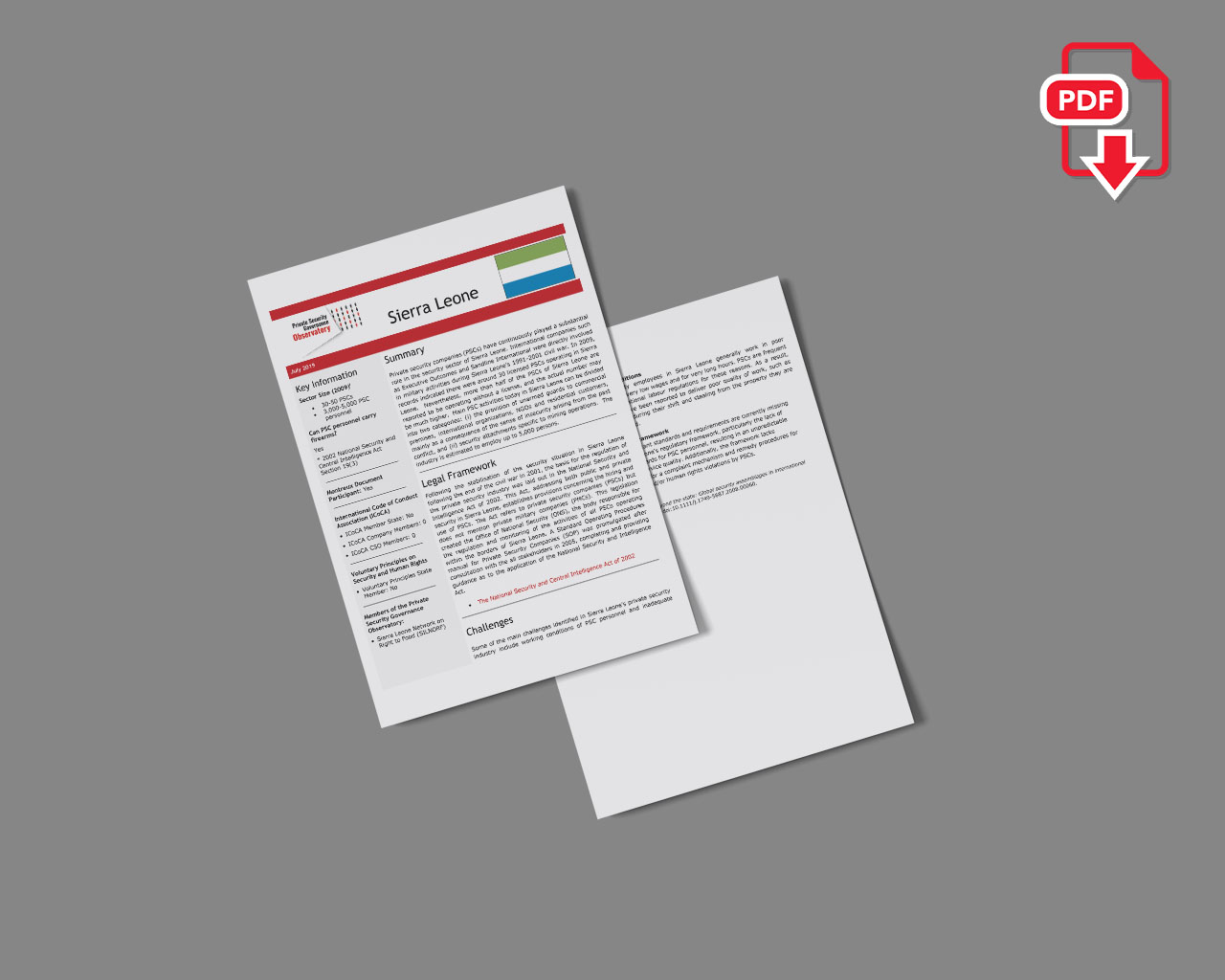Sierra Leone
Private security companies have continuously played a substantial role in the security sector of Sierra Leone. International companies such as Executive Outcomes and Sandline International were directly involved in military activities during Sierra Leone’s 1991-2001 civil war. In 2009 between 30 and 50 PSCs were operating in Sierra Leone, employing up to 5,000 personnel, however more than half of the PSCs in the country are operating illegally so the true number of companies and personnel is unknown.
Main law regulating private security: NATIONAL SECURITY AND INTELLIGENCE ACT OF 2002
Key Information |
|
Sierra Leone is a participant to the Montreux Document. |
|
Sector Size (2009)[i]
|
Can PSC personnel carry firearms?
|
International Code of Conduct Association (ICoCA)
|
Voluntary Principles on Security and Human Rights
|
Summary
Private security companies (PSCs) have continuously played a substantial role in the security sector of Sierra Leone. International companies such as Executive Outcomes and Sandline International were directly involved in military activities during Sierra Leone’s 1991-2001 civil war. In 2009, records indicated there were around 30 licensed PSCs operating in Sierra Leone. Nevertheless, more than half of the PSCs of Sierra Leone are reported to be operating without a license, and the actual number may be much higher. Main PSC activities today in Sierra Leone can be divided into two categories: (i) the provision of unarmed guards to commercial premises, international organizations, NGOs and residential customers, mainly as a consequence of the sense of insecurity arising from the past conflict, and (ii) security attachments specific to mining operations. The industry is estimated to employ up to 5,000 persons.
Legal Framework
Following the stabilisation of the security situation in Sierra Leone following the end of the civil war in 2001, the basis for the regulation of the private security industry was laid out in the National Security and Intelligence Act of 2002. This Act, addressing both public and private security in Sierra Leone, establishes provisions concerning the hiring and use of PSCs. The Act refers to private security companies (PSCs) but does not mention private military companies (PMCs). This legislation created the Office of National Security (ONS), the body responsible for the regulation and monitoring of the activities of all PSCs operating within the borders of Sierra Leone. A Standard Operating Procedures manual for Private Security Companies (SOP) was promulgated after consultation with the all stakeholders in 2005, completing and providing guidance as to the application of the National Security and Intelligence Act.
Challenges
Some of the main challenges identified in Sierra Leone’s private security industry include working conditions of PSC personnel and inadequate legislation.
Working conditions
Private security employees in Sierra Leone generally work in poor conditions for very low wages and for very long hours. PSCs are frequent violators of national labour regulations for these reasons. As a result, employees have been reported to deliver poor quality of work, such as falling asleep during their shift and stealing from the property they are meant to guard.
Regulatory framework
Several important standards and requirements are currently missing from Sierra Leone’s regulatory framework, particularly the lack of training standards for PSC personnel, resulting in an unpredictable variation in service quality. Additionally, the framework lacks requirements for a complaint mechanism and remedy procedures for misconduct and/or human rights violations by PSCs.
Members of the Private Security Governance Observatory
- Sierra Leone Network on Right to Food (SILNORF)
[i] Abrahamsen, R., & Williams, M. (2009). Security beyond the state: Global security assemblages in international politics. International Political Sociology, 3(1), 1–17. doi:10.1111/j.1749-5687.2008.00060.
Regulation and Oversight
Information about National Regulations and Regional and International Initiatives.
